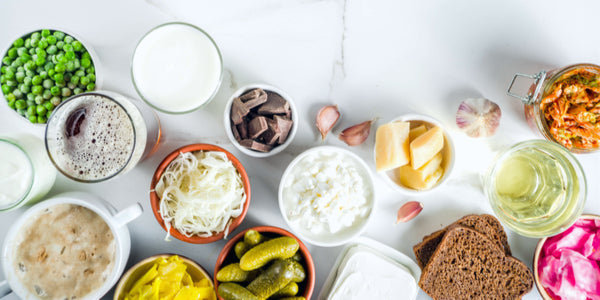
Probiotics, prebiotics, and products for a healthy gut microbiota have become a hot topic in the wellness world in recent years. These words are commonly seen on packages and knowledge of their health benefits is rumored.
So, what do prebiotics do? What about a prebiotic vs probiotic, and what is the difference between prebiotic and probiotic?
The short answer is that although the two are different, they both have the same goal of benefitting the growth of "good" gut bacteria.
Read on to learn more about prebiotics, probiotics, and which ones you should be taking.
What Is the Difference Between Probiotics & Prebiotics?
Prebiotics occur naturally and are non-digestible food components (not bacteria) that encourage the growth of "good" gut bacteria. In other words, they are parts of food that are helpful in promoting the kind of bacteria that aids intestinal health. Prebiotic foods are typically high in fiber since they themselves act as food for the gut microbiota and probiotics.
Probiotics are live bacteria cultures that are considered "good" and beneficial bacteria, such as the bacteria naturally found in the gut. These cultures help to balance the intestinal bacteria environment that has the power to restore gastrointestinal (GI) health and overall quality of life. Probiotics main job is to help maintain a healthy environment or "good" gut bacteria community.
Pre- and probiotics work in a synergistic relationship. Prebiotic fiber is considered a food source for probiotics, which then go on to balance gut bacteria. Both play an important role in restoring or establishing GI health, especially in the event that the body's gut health has been disturbed or threatened.
Also worthy of mentioning, postbiotics are a new frontier in medicine and are thought to contain powerful properties that play a role in regulating every organ system. Postbiotics are functional fermentation compounds produced by probiotic bacteria. They are essentially the "waste" products of probiotics fermenting prebiotics.
Like pre- and probiotics, postbiotics come in many forms. Since each individual has a unique gut environment, different forms may help different people in improving gut health.
What Do Prebiotics Do?
Prebiotics are thought to improve digestive health and calcium absorption. Calcium facilitates many important chemical reactions in the human body, and so increased absorption can affect overall health and human function.
These food components are selective in their activity, and they choose to stimulate the growth of "good" or desirable gut bacteria. Like probiotics, they are used with the intention of improving intestinal balance.
What Do Probiotics Do?
Probiotics are considered functional components that can boost immunity and aid in overall health, particularly in balancing the gut microbiome. They are live bacteria with the intention of improving human health. Many of the bacteria in probiotic products are similar to the bacteria that naturally occur in the human body.
Those with compromised immune systems or underlying health conditions are at greater risk for experiencing serious side effects of probiotic use, even though they have an extensive history of safe use.
High-risk individuals are advised to weigh the risks and benefits of probiotic use with their healthcare professionals to determine the best course of treatment.
What Is Gut Bacteria & How Does Food Affect It?
Gut bacteria, or the community of microorganisms that reside in the intestines, is often referred to as the gut microbiota or microbiome. Trillions of bacteria living in the gut are normal bacteria and help balance the health of the human body.
However, an imbalanced intestine can cause disease and contribute to serious risks and complications. Researchers are continually looking into biotic products because it reveals links between interacting food components and bacteria in the GI tract.
What has been established is clear: healthy dietary eating patterns can interact with the gut to produce benefits for the human body that reach beyond the GI tract.
Foods Containing Pre & Probiotics
There are many foods that contain pre- and probiotics. Some foods even contain both, and these foods are also known as synbiotic products.
Foods Containing Prebiotics
• Bananas
• Onions
• Garlic
• Leeks
• Asparagus
• Artichokes
• Beans
• Whole-grain foods
Foods Containing Probiotics
• Fermented dairy foods (yogurt, kefir)
• Fermented non-dairy foods (kimchi, sauerkraut, miso, tempeh, cultured non-dairy yogurts)
• Aged cheeses
• Kombucha
Foods Containing Both Pre- & Probiotics
• Raw foods, vegetables & fruit (bananas, whole grains, greens, onions, garlic, soybeans, artichokes)
• Fermented pickles
• Dairy products
Should I Be Taking One or the Other?
In general, healthy people often do need to take a supplement to improve their gut health. However, there are circumstances that can disrupt a healthy digestive tract, including a poor diet, physical inactivity, excessive alcohol intake, and smoking.
Overall, adding prebiotic and probiotic foods to the diet is a simple way to help improve gut health naturally. These foods can also influence the body's immune response, and studies have shown they can be used for a variety of health purposes, including but not limited to:
• Atopic eczema (skin condition commonly seen in infants)
• Prevention of antibiotic-associated diarrhea
• Prevention of necrotizing enterocolitis
• Sepsis in infants
• Treatment of infant colic
• Treatment of periodontal disease
• Ulcerative colitis, including induction, maintenance, or remission
People taking an antibiotic may be recommended to one in an effort to replenish good bacteria. Antibiotics treat and prevent bacterial infections by killing off harmful bacteria in the body. However, antibiotics cannot differentiate good versus bad bacteria in the body, thus killing off both.
On the flip side of the coin, taking a probiotic can be harmful to some populations. People who are immunocompromised or take an immunosuppressant are often advised to not take a probiotic. This may include those living with HIV, who are critically ill, or recently out of surgery. There are also special precautions for children and pregnant and lactating women.
What Probiotics Should I Take?
There are many different types of bacteria in probiotics, and different people will experience different effects. There is still a lot for even the experts to learn, and the best course of action is to seek medical advice for appropriate recommendations.
When used properly, pre- and probiotics can be a powerful agent of change and balancing force, both for an individual's gut bacteria and beyond the borders of the intestine to benefit the whole body.
If advised or permitted to take a probiotic, ask for the assistance of a doctor regarding which probiotic might be best for you. Baring in mind the guidance from your doctor, also what should look for the following criterion when choosing a probiotic supplement.
Live Cultures
Good brands should disclose the exact strain of microorganisms and the amount contained, which is indicated as colony-forming units (CFUs). Generally, the higher the CFUs (at least in the billions), the greater the benefits.
If the probiotic is blended with various microorganisms, try finding a product that lists the CFU for each specific strain.
Reliability
It is important to find a product you can rely on and trust, even if it means forking out a little extra money. Researching the brand can help validate the quality and value of the brand, including evidence-based studies that back their claims.
Likewise check to see if a third-party company, including USP or ConsumerLab, tested the product. Your doctor can also assist in finding a reputable product.
Expiration Dates
Find a product with a designated expiration date. This helps determine the likelihood that your probiotics remain alive for their indicated duration.
What's more, the amount of CFUs may decline as the product ages.
Storage Instructions
Remember, probiotics are live microorganisms and should be stored in a refrigerated, low-moisture environment unless freeze-dried or specifically indicated otherwise.
Make sure the retailer has likewise kept the probiotics under such conditions to ensure a safe, effective product.
Added Ingredients
Be aware of any added ingredients to the probiotic. This is especially important if allergic to some common additives, including dairy or soy.
It is important to recognize supplements are sold as dietary supplements and, therefore, are not regulated by the U.S. Food and Drug Administration (FDA). Probiotics also come in varying doses with each supplement coming with its own set of instructions.
That being said, always read the label on the probiotic closely before taking, follow the directions deliberately, and store as indicated to preserve its lifespan.
The Bottom Line
While research is still emerging, probiotics appear to provide beneficial effects for a number of different conditions and may also improve overall health and quality of life. There is often no harm in taking a probiotic supplement beyond potential unpleasant side effects, including abdominal cramps, bloating, and gas.
If you are a generally healthy person, you can likely ensure a healthy gut by:
• Consuming probiotic-rich foods
• Ensuring adequate fiber
• Drinking sufficient water
• Exercising regularly
• Managing stress
• Adopting an overall healthy lifestyle
Ultimately, though, always do your research before taking any sort of supplement and advise a healthcare provider for additional assistance.
References:
Prebiotics and probiotics creating a healthier you. Eatright.org. https://www.eatright.org/food/vitamins-and-supplements/nutrient-rich-foods/prebiotics-and-probiotics-creating-a-healthier-you.
Markowiak P, Śliżewska K. Effects of probiotics, prebiotics, and synbiotics on human health. Nutrients. 2017;9(9):1021.
5 things to know about probiotics. Nih.gov. https://www.nccih.nih.gov/health/tips/things-to-know-about-probiotics.







